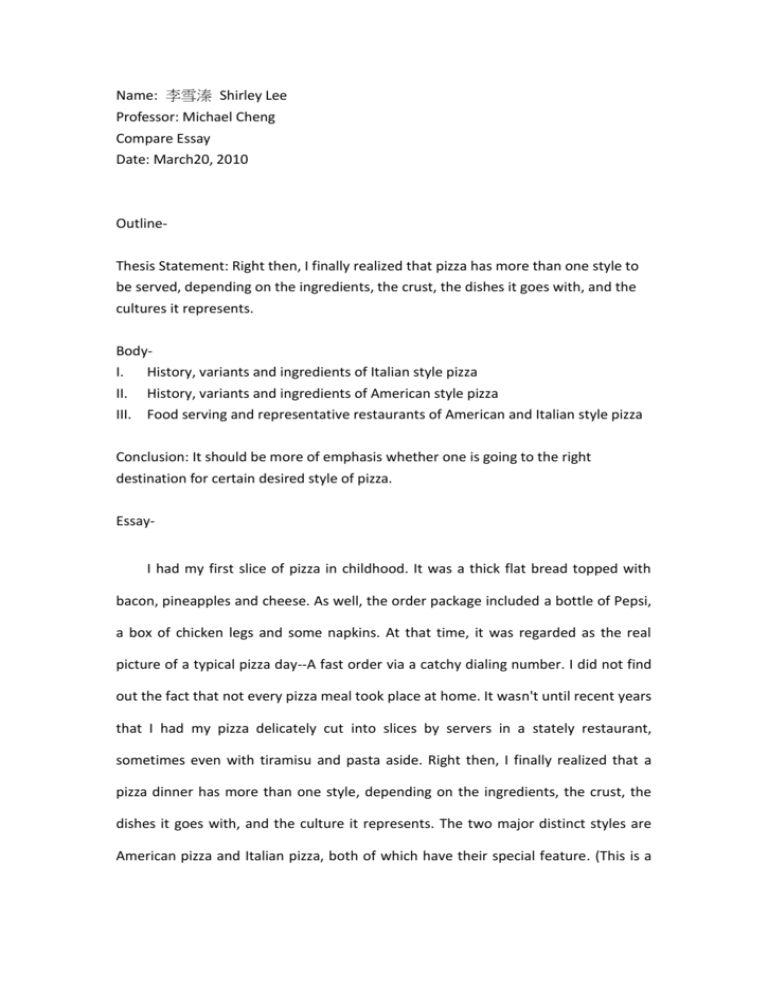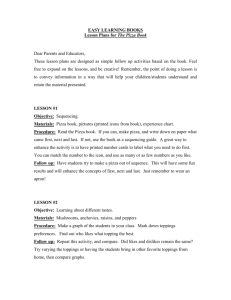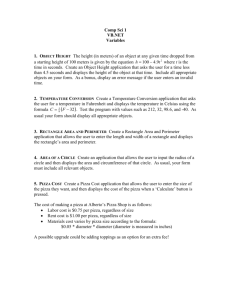CC2_Shirley_Pizza_edit2
advertisement

Name: 李雪溱 Shirley Lee Professor: Michael Cheng Compare Essay Date: March20, 2010 OutlineThesis Statement: Right then, I finally realized that pizza has more than one style to be served, depending on the ingredients, the crust, the dishes it goes with, and the cultures it represents. BodyI. History, variants and ingredients of Italian style pizza II. History, variants and ingredients of American style pizza III. Food serving and representative restaurants of American and Italian style pizza Conclusion: It should be more of emphasis whether one is going to the right destination for certain desired style of pizza. EssayI had my first slice of pizza in childhood. It was a thick flat bread topped with bacon, pineapples and cheese. As well, the order package included a bottle of Pepsi, a box of chicken legs and some napkins. At that time, it was regarded as the real picture of a typical pizza day--A fast order via a catchy dialing number. I did not find out the fact that not every pizza meal took place at home. It wasn't until recent years that I had my pizza delicately cut into slices by servers in a stately restaurant, sometimes even with tiramisu and pasta aside. Right then, I finally realized that a pizza dinner has more than one style, depending on the ingredients, the crust, the dishes it goes with, and the culture it represents. The two major distinct styles are American pizza and Italian pizza, both of which have their special feature. (This is a basic division of pizza, for even America itself has countless regional styles.1) The questions are: How are these two styles of pizza different from each other, and where should we head to get the right style of pizza we are craving for? Although pizza might have originated from Greece, it was in Naples, Italy that the food prospered and became world renowned. 2 In the sixteenth century, Neapolitans created the original pizza—yeast dough added with tomatoes, olive oil, herbs and cheese. It was at first a basic dish provided for the poor, but later made for an incentive for tourists to venture into Naples. One authentic Italian pizza is Margherita—a pizza garnished with tomatoes, mozzarella cheese (the first kind of pizza to which cheese was added) and basil, which was made to impress the Queen Margherita by endorsing the idea of the three colors on the Italian national flag into the pizza in 1889.3 Furthermore, other typical Italian pizzas are the “four seasons pizza”— which consists of mainly four ingredients standing for four seasons, and the “marinara pizza.” The former one is mozzarella, tomato, mushrooms, artichokes, ham, olives, while the latter one is topped with tomato, garlic, oregano and oil. Generally speaking, authentic Italian pizzas are made with ingredients such as tomatoes, mozzarella cheese, herbs, also topped with Mediterranean food. According to Wikipedia, typical Italian pizzas should be thin-crust, by definition of less than 3mm thick, and they should taste “crispy, tender and fragrant.”4 As Italy was founding its authentic pizza flavors, America was about to start off a new trend for pizza. 1 Slice Pizza Blog, by Adam Kuban, Jan.2008, http://slice.seriouseats.com/archives/2008/01/a-list-of-regional-pizza-styles.html 2 “Is Pizza Italian Or Is Pizza American?”, Mar 2009, http://www.articlesbase.com/main-course-articles/is-pizza-italian-or-is-pizza-american-820899.html 3 “History of Pizza-The Soul of Italy”, by Justin Demetri, Mar.2010, http://www.lifeinitaly.com/food/pizza-history.asp 4 Pizza Types, Pizza, Wikipedia, March 2010, http://en.wikipedia.org/wiki/Pizza#Pizza_types Pizza arrived in America following Italian immigration in the late nineteenth century. Owing to the wide influence of Italian immigrants in American culture, a great amount of regional forms of pizza were developed, many bearing a resemblance to the Italian originals. This especially happened in cities with large Italian population, mostly northeastern cities, where pizzas were sold by street vendors in immigrant community.5 Pizza restaurants (as what we call “pizzerias”) and new styles of pizzas appeared in America consequently. The first pizzeria is said to be “Lombardo” founded in 1905 in Manhattan.6 Later in 1943 came “Chicago Deep-Dish Pizza”, with its crust formed up the sides of a deep-dish pan, filled with loads of cheese, tomatoes and sausages. 7 Overall, American pizzas come in even more varieties than Italian pizzas do. American pizzas feature more non-traditional ingredients, which are not considered by Italian cooks, such as pineapples, seafood, poultry, barbecue sauce, garlic and chili peppers, as well as “white pizza” without the typical ingredient—tomato sauce.8 Moreover, unlike Italian thin-crusted pizzas, both thin and thick crusts are commonly used in American pizzas. For instance, the Chicago style pizza mentioned above is made with a thick crust, while “New York Style Pizza” traditionally includes hand-tossed thin crust.9 Another distinction between these two styles is culture and lifestyle revealed as in how they embark on a typical pizza meal. Frozen pizzas were introduced in 1957 and American pizza chain shops gradually boomed in the 1960s.10 Pizza chain outlets 5 “How Pizza Works”, from TLC Cooking, by Alia Hoyt, May 2010, http://recipes.howstuffworks.com/fresh-ideas/dinner-food-facts/pizza1.htm 6 History & Legends of Pizza, Mar. 2010, http://whatscookingamerica.net/History/Pizza/PizzaHistory.htm 7 “A Field Guide to American Pizza-Chicago”, by Bret Stetka, Mar. 2010, http://cityguides.msn.com/articles/article.aspx?cp-documentid=19549190&page=2 8 Pizzas In the United States, Wikipedia, Mar. 2010, http://en.wikipedia.org/wiki/Pizza_in_the_United_States 9 “New York-style Pizza: what it means”, by Betty Hallock, Mar. 2009, http://articles.latimes.com/2009/mar/25/food/fo-newyorkpizza25 10 “American Pie”, from American Heritage Magazine, April/May 2006, by Hanna Miller, have created a unique way, which as we have called “American style”, to consuming pizzas. Pizza chains like Pizza Hut11 and Domino’s12 are so globalized that they can be seen in Taiwan and everywhere else in the world nowadays. There are several ways you can dine with these Americanized pizza shops: One is to eat in the franchised restaurant with the buffet providing “all-you-can-eat” pizza, salad, fries and nuggets, beverage and chicken legs13; another is to make your pizza order online or via phone. “You’ve got thirty minutes,” said Domino’s TV commercial, leaving you an opportunity to savor the food within such a short time!14 On the other hand, having pizza in the Italian style is an experience where you dine in an exquisite, European-like restaurant, with side dishes like bread and tiramisu on the table. There are some restaurants in Taiwan where you can indulge in the exotic atmosphere. One example is a restaurant franchise “Grazie,” with branches all over Taiwan.15 The restaurant’s specialty is Italian cuisine, including pizza, pasta, risotto and such. Its exotic décor makes it a perfect place to dig in to Italian style pizza. Both American-styled and Italian-styled pizzas have similar and different traits to stand for. Toppings and crust added with pizza are different from both styles. In addition, the dining style for each type of pizza vary with the cultures, hence restaurants serving pizza don’t always sell the same way. Fairly speaking, in spite of the comparison between the two styles, there should be no battle between American style pizza and Italian style pizza for determining the one with better taste. http://www.americanheritage.com/articles/magazine/ah/2006/2/2006_2_30.shtml 11 Pizza Hut Taiwan, March 20, http://www.pizzahut.com.tw/English/location/Middle.asp 12 Domino’s Pizza Taiwan, March 20, http://www.dominos.com.tw/ 13 A Hungry Girl’s Guide to Taipei, Feb. 15, 2008, http://hungryintaipei.blogspot.com/2008/01/revisitedpizzabuffet-pizza-hut.html 14 “Will a Twist on an Old Vow Deliver for Domino's Pizza?” by Janet Adamy, Dec 17 2007, http://online.wsj.com/public/article/SB119784843600332539-oueLUGs3hGQrgDILS9KzspIC8Rk_20081 216.html 15 Café Grazie, March 20, 2010, http://www.grazie.com.tw/html/homepage.asp It should be more of an emphasis on whether one is going to the right destination for the desired style of pizza. After all, savory food fitting the appetite is the most important of all. Quite an interesting and fun paper. You need to be sure that the claims that you make in your conclusion match what you proved in your paper. There are some unidiomatic phrases or use of vocabulary in the paper. B+









